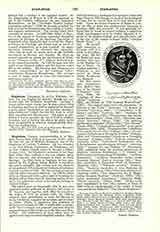

Stapleton, THOMAS, controversialist, b. at Henfield, Sussex, July, 1535; d. at Louvain, October 12, 1598. He was the son of William Stapleton, one of the Stapletons of Carlton, Yorkshire. He was educated at the Free School, Canterbury, at Winchester, and at New College, Oxford, where he became a fellow, January 18, 1553. On Elizabeth‘s accession he left England rather than conform to the new religion, going first to Louvain, and afterwards to Paris, to study theology. In 1563, being in England, he was summoned by the Anglican bishop Barlow to repudiate the pope’s authority, but refused and was deprived of the prebend of Woodhorne in Chichester Cathedral, conferred on him in 1558. He then retired to Louvain with his father and other relatives. In 1568 he joined Allen at Douai and took a great part in founding the English college there, both by lecturing and by devoting to its support his salary as lecturer in theology at Anchin College.
His talents were so remarkable that he was soon appointed public professor of divinity, and canon of St. Amatus; and together with Allen he completed the degree of D.D. on July 10, 1571. In 1584 he resigned these preferments to enter the Society of Jesus, but did not complete his novitiate, and returned to Douai. Philip II appointed him professor of Scripture at Louvain in 1590, to which office a canonry in St. Peter’s Church was annexed; and soon after he was made dean of Hilverenbeeck in the Diocese of Boisle-Duc. The emoluments of these offices were all spent in relieving necessitous English Catholics. Meanwhile his fame as a theologian had spread to Rome and Pope Clement VIII thought so much of his theological writings that he caused them to be read aloud at his table. Twice he invited Stapleton to Rome in vain, but his offer to make him prothonotary Apostolic in January, 1597, was accepted. It was generally believed that he would be created cardinal, a suggestion which was disapproved of by Father Agazzari, S.J., rector of the English College, and obstacles were put in the way of his journey to Rome (Eley, “Certaine Briefe Notes”, p. 254). He accordingly remained at Louvain till his death in the following year. He left his books and manuscripts (now lost) to the English College at Douai. An original painting of Stapleton is preserved at Douai Abbey, Woolhampton, England.
His first works were translations: Ven. Bede‘s “History of the Church in England” (Antwerp, 1556), the “Apology of Staphylus” (Antwerp, 1565), and Hosius on “The Expresse Word of God” (1567). His original works were very numerous: “A Fortress of the Faith” (Antwerp); “A Return of Untruths” (Antwerp, 1566); “A Counterblast to M. Home’s vain blast” (Louvain, 1567); “Orationes funebres” (Antwerp, 1577); “Principiorum fidei doctrinalium demonstratio” (Paris, 1578); “Speculum pravitatis hceretiese” (Douai, 1580); “De universa justificationis doctrina” (Paris, 1582); “Tres Thomae” (Douai, 1588); “Promptuarium morale” in two parts (Antwerp, 1591, 1592); “Promptuarium Catholicum in Evangelia Dominicalia” (Cologne, 1592); “Promptuarium Catholicum in Evangelia Ferialia” (Cologne, 1594) and “Promptuarium Catholicum in Evangelia Festorum” (Cologne, 1592); “Relectio scholastica” (Antwerp, 1592); “Authoritatis Ecclesiasticce circa S. Scripturarum approbationem defensio” (Antwerp, 1592); “Apologia pro rege Philippo II” (Constance, 1592), published under the punning pseudonym of Didymus Veridicus Henfildanus, i.e. Thomas the Stable-toned [truth-speaking] Henfieldite. “Antidota Evangelica”, “Antidota Apostolica contra nostri Temporis Haereses” (both at Antwerp, 1595); “Antidota Apostolica in Epistolam Pauli ad Romanos” (Antwerp, 1595); “Triplicatio inchoata” (Antwerp, 1596); “Antidota Apostolica in duas Epistolas ad Corinthios” (Antwerp, 1598); “Orationes catecheticie” (Antwerp, 1598); “Vere admiranda, seu de Magnitudine Romance Ecclesiae” (Antwerp, 1599); “Orationes academic ce miscellanese” (Antwerp, 1602); “Oratio academica” (Mainz, 1608). All his works were republished in four folio volumes in Paris in 1620, with an autobiography of the author in Latin verse and Henry Holland‘s “Vita Thomae Stapleton”.
EDWIN BURTON

